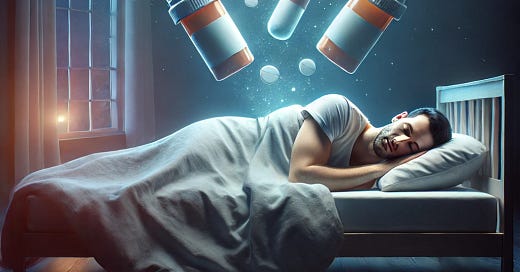“Sleep is a criminal waste of time and a heritage from our cave days"
Thomas Edison - 1847 - 1931 - Day 326 of 2024 - 37 remain
Thomas Edison was one of the most prolific inventors in history, with over 1,000 patents. His contributions spanned multiple industries and profoundly impacted modern life.
Some of his greatest inventions were the incandescent Light Bulb (1879) and the Phonograph (1877), the first device capable of recording and playing back sound.
I remember telling my daughters that Thomas Edison invented the lightbulb and that he used to sleep only four hours a night.
My youngest daughter said, “If I invented the lightbulb, Daddy, I would probably stay up all night just looking at it, thinking how great I was.”
Thomas Edison also said, “The doctor of the future will no longer treat the human frame with drugs, but rather will cure and prevent disease with nutrition.”
Where across the course of your day today could you consider where it might be that you focus on the importance of sleep?
Sleep has so much to offer the brain and the body besides rest.
During deep sleep (slow-wave sleep or SWS), the body repairs tissues, muscles, and bones and promotes growth. Proteins are synthesized, and cell regeneration is at its peak.
Sleep strengthens the immune system by enhancing the production of infection-fighting cytokines and antibodies. This helps the body combat illnesses and heal faster.
The body reduces its metabolic rate, conserving energy and replenishing it for the next day.
During sleep, especially REM (rapid eye movement), the brain processes information gathered during the day. It strengthens important memories, integrates new information, and discards irrelevant details.
Where across the course of your day today could you consider setting the alarm to send yourself to bed, as well as for when you should wake up in the morning?
It takes as much discipline to go to bed early, as it does to wake up early and get out of bed.
When we sleep, the glymphatic system becomes highly active, flushing out waste products, including neurotoxic substances like beta-amyloid (linked to Alzheimer's).
Sleep facilitates synaptic pruning, removing unnecessary neural connections and reinforcing important ones. This helps maintain brain efficiency and learning capacity.
REM sleep, often called "dream sleep," helps process emotions and experiences. This is critical for emotional resilience, reducing anxiety, and improving mood.
Where across the course of your day today could you consider where it might be that you are tired and emotional?
Dreaming allows the brain to revisit and reprocess challenging or traumatic events in a low-stress context.
Cortisol, the stress hormone, is kept low during sleep but begins to rise toward morning, preparing the body for wakefulness.
Dreams occur primarily during REM sleep and may help with problem-solving, creativity, and emotional processing.
The brain may work through unresolved issues or practice hypothetical scenarios, aiding decision-making and emotional balance.
When sleep is disrupted or insufficient, these processes are impaired, leading to memory issues, poor concentration, weakened immunity, increased stress and a higher risk of chronic illnesses like heart disease and diabetes.
Thomas Edison may have been a prolific inventor, but he wasn’t necessarily a prophet. Too many of the human body's medical conditions could be cured or prevented with a consistent sleep routine every night.
While you’re thinking about that, think about this and have a Gr8 day!
Be well.
DL
“To sleep perchance to dream.”
William Shakespeare 1564 - 1616





